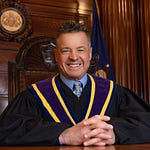If you enjoyed my very first blog, Underneath Their Robes (2004-2006)—which I wrote under a pseudonym while working as a federal prosecutor, pretending to be a female associate in Biglaw obsessed with federal judges and fashion—then you’ll enjoy this latest podcast episode. How many podcasts combine analysis of Supreme Court oral arguments with discussion of pumps versus cowboy boots versus Mary Janes? (For the record, my guest made the first reference to shoes; I didn’t go there unprompted.)
My latest guest is—of course—the inimitable Lisa Blatt, chair of the Supreme Court and appellate practice at Williams & Connolly, the legendary litigation firm. Lisa needs no introduction to Original Jurisdiction devotees, so I’ll mention just two distinctions.
First, Lisa has argued 43 cases before the U.S. Supreme Court, more than any other woman in history. Second, she has won 37 of those 43 cases (86 percent), which makes her one of the most consistently victorious SCOTUS advocates. (Trivia question: is there a Supreme Court lawyer currently practicing who has argued that many cases before the high court with that high a win percentage?)
In our ebullient and enjoyable interview, Lisa and I covered her special relationship with the late Justice Ruth Bader Ginsburg, for whom she clerked; how she rose to the top of the male-dominated Supreme Court bar, as a woman from Texas who “didn’t go to a fancy law school”; how she developed her distinctive, famously unfiltered style of oral argument; and why she prefers cowboy boots over stiletto heels. I hope you have as much fun listening to this episode as Lisa and I had recording it.
Show Notes:
Lisa Blatt bio, Williams & Connolly LLP
Reflections of a Lady Lawyer, Texas Law Review
Prefer reading to listening? A transcript of the entire episode appears below (although you really should listen to this one, since as is the case with her SCOTUS arguments, a transcript doesn’t do Lisa justice).
Two quick notes:
This transcript has been cleaned up from the audio in ways that don’t alter meaning, e.g., by deleting verbal filler or adding a word here or there to clarify meaning (although I’ve done less clean-up than usual to better preserve the flavor of our fabulous and freewheeling conversation).
Because of length constraints, this newsletter may be truncated in email. To view the entire post, simply click on "View entire message" in your email app.
David Lat: Hello, and welcome to the Original Jurisdiction podcast. I’m your host David Lat, author of a Substack newsletter about law and the legal profession also named Original Jurisdiction, which you can read and subscribe to by visiting davidlat.substack.com.
You’re listening to the seventh episode of this podcast, recorded on Wednesday, November 30. My normal schedule is to post episodes every other Wednesday.
I must confess, with all due respect to my past guests, that this episode might be the most fun one yet—and I owe it all to my guest. Lawyers are known for being risk-averse and many carry that over into their interviews, not wanting to say anything that might get them in trouble or rub someone the wrong way. That’s definitely not true of my latest guest, who’s known for her refreshing candor, whether you’re chatting with her at a cocktail party or whether she’s arguing before the United States Supreme Court.
Lisa Blatt serves as Chair of Williams & Connolly’s Supreme Court and appellate practice. She has argued 43 cases before the Supreme Court, more than any other woman in history. And she has prevailed in 37 of those 43 cases, giving her a win percentage of 86 percent—which has to be one of the highest around, at least among advocates who have argued before the Court as often as she has. She has won numerous awards, including Litigator of the Year from the American Lawyer in 2021.
Lisa graduated from the University of Texas for both college and law school, summa cum laude both times. She clerked for then-Judge Ruth Bader Ginsburg on the D.C. Circuit and then joined Williams & Connolly as an associate. After government service, at the Department of Energy and then the Office of the Solicitor General, where she worked for 13 years, Lisa returned to private practice, and in 2019, she came full circle by returning to Williams & Connolly.
In our lively and wide-ranging conversation, Lisa and I discussed her unique relationship with the late Justice Ginsburg, for whom she clerked; her distinctive approach to Supreme Court oral advocacy, including her thoughts on trying humor with the justices; why she loves coaching debate; and why she thinks lawyers should not be passionate about their work.
Without further ado, here’s my interview of Lisa Blatt.
DL: Lisa, thank you so much for joining me. I'm honored to have you on the podcast.
Lisa Blatt: Well, thank you. I am honored to be here.
DL: So if I had to guess where you're from based on meeting you at a cocktail party or hearing you argue before the Court, I would've guessed you're one of us, a New Yorker or a Northeasterner. But you're from Texas.
LB: That's right. Both of my parents are from New York, and I grew up listening to the word “y'all” with a very thick New York accent, so everyone assumes I'm from New York. But no, I was born and raised in Texas, West Texas. I moved all over Texas, UT for undergrad and law school, and a lot of my personality is because I'm from Texas. And I think I'm on my 12th pair of cowboy boots?
DL: Oh wow, okay!
LB: I’m definitely a Texan. Part of the way I talk just is because my parents are both from New York.
DL: That makes sense. And you have a kind of candor, although I guess Texans are pretty candid too, aren't they?
LB: I don't think my candor comes from being from Texas! I don't know where that comes from, actually—no one in my family's like that.
DL: Fair enough. So going to your upbringing in Texas, were there any hints that you might become a lawyer? I believe your parents were not lawyers.
LB: Right. Dad was a software engineer, Mom a stay-home mom until she became a psychologist. But no, I think it was Thurgood Marshall, something about his story of Brown—I still get sort of teary when I think about it—something about his story of what he did in Brown v. Board of Education, being the lawyer, the advocate, not the justice. I just wanted to be a lawyer and I did debate, speech and debate starting maybe in seventh grade, I was always very into debate and just knew that I wanted to go to law school.
DL: What events did you do in speech and debate?
LB: Now it’s embarrassing, but policy debate, which is all that fast talking, and I had to unlearn that many years later. But yeah, I did policy debate and I spent many years coaching debate, so I do love the art of advocacy and argumentation and trying to persuade someone.
DL: I read in one of your profiles or interviews that you do coach or did coach debate. What was that like for you? It seems like you're very competitive about coaching debate?
LB: No, actually that's not right. I'm very passionate about coaching debate, and I feel very strongly about coaching; it’s what I would definitely do if I wasn't a lawyer, and I feel very passionate about helping children and kids. But I don't think it's about winning—and that's one of the things you have to teach kids, because they just want a trophy. So much in life when it comes to competition and jobs is arbitrary and capricious. One of the things that is so important for us, even adults, to understand is that some stuff is out of our control. If I can just teach one child how to stand up straight and feel good about an argument, then that's a home run. So I love everything about coaching debate.
Also, the different perspective was just a huge thing, getting a bunch of kids in a room. I've taught middle-school debate and high-school debate, and I would say my favorite was middle school because they're not yet completely sold on their politics and ideology, and trying to just get them to open up about things like background checks or hate speech or should dodgeball be banned in schools because it's violent. Just anything, any topic—nowadays not all topics are as safe as others, but just lots of fun topics—which tastes better, Coke or Pepsi, anything that you can just form an argument about and how to organize your responses.
Look how excited I get! Just the notion of being able to teach this in a way that is helpful, especially for women, and a lot of kids are very insecure at this age, and everything about trying to show them that they can be confident is just the best thing in the whole world.
DL: Speech and debate was huge for me in that respect. I was a very nerdy kid, very insecure, but when I found something and I enjoyed it, and I was good at it, it was a big boost for my confidence. So your husband's a lawyer, you're a lawyer, I believe you have two kids—are either of them into speech and debate?
LB: One's in law school, they both did debate, and the other one's just applying and now getting into law school. So we're going to be Blatt & Associates, or Blatt Blatt Blatt & Blatt. David, my husband, no debate, he finds it completely foreign, but both Daniel and Rachel did debate.
DL: Excellent. So in doing my research, I did come across your wedding announcement when you and David got married. I'm curious: did you give much thought to the whole “take his name or not take his name” thing?
LB: My maiden name is Schiavo, so I was so eager, I would've married anybody with any last name—as soon as somebody gave me a proposal, the answer was yes. So yes, I gave a lot of thought to taking his last name. Everyone mispronounced Schiavo. Actually its direct translation is “slave” in Italian. So I was happy to [take his name], I happen to love Blatt, which rhymes with your last name. It's so great.
DL: It's very easy to spell. The only issue is one or two t’s, but absolutely.
LB: I’m actually fine with people—a lot of people still know me as Lisa Schiavo, and that's fine too—but I like being Lisa Blatt.
DL: So as we talked about, you went to UT for college and law school, summa cum laude, did super well. And in some ways your first big break, I would say, was clerking for then-Judge Ruth Bader Ginsburg on the D.C. Circuit. She was a great advocate and a great justice, but some say she wasn't warm and fuzzy with her clerks. But based on your great piece for the Texas Law Review—Reflections of a Lady Lawyer, which I'm going to put in the show notes—it sounds like you had a fairly close relationship with her?
LB: Extremely, because I couldn't talk about the law with her! I'm being completely serious. Both my co-clerks were absolutely brilliant people from Harvard, on the Harvard Law Review, but that was just never going to go anywhere with me, to talk with her about the law. And so I'm probably one of her few clerks where it was shoes, jewelry, or clothes. I could not keep up with her, and we talked about fashion.
When it was one of her huge anniversaries, it may have been her tenth year on the Court, twenty years on the bench, there were only two people, maybe three people who gave a toast, and I was one of them. And everyone talked about all her this, that, and the other thing, legal giant—and I spent the whole time roasting her about how skinny she was and all her jewelry and how she was an airhead, and she was cracking up. But she liked people who made her laugh, and I think I made her laugh.
DL: That makes perfect sense. Look at [her late husband] Marty, look at [her good friend] Justice Scalia, and you. She was somewhat reserved or introverted, but she was drawn to people who could bring her out.
LB: She's so hard to talk to about… I just couldn't talk to her about the law, and I was probably her least productive and least intelligent clerk. I remembered at this toast I did for her, I showed everyone the bench memo I did for her, it was a made-up thing, but she took only the caption—a draft opinion, I drafted the opinion, and she cut out the caption and used that for the opinion. It’s true, it was a true story, but I did it on a big blowup poster and it was very funny. And I was also her first and last clerk from University of Texas, because she's such a snob, a super school snob….
DL: That is true. Yeah….
LB: Some of them are very, very specific about their Ivy League schools. But I loved her, and I do think it was a different relationship than she had with other clerks. Very different.
DL: That makes perfect sense. You mentioned you both were into or bonded over fashion. Did you have similar or different styles?
LB: No, she was so weird! She would just—come on, she wore all those caftans, at least back in when she was on the D.C. Circuit. Actually, now I think I dress like her because I love bright colors, and she definitely is where I got my “you know what, just wear it, own it.” Because she would show up in the strangest outfits and she just like looked very happy and I thought, “Wow, I wanna be her, she's beautiful.” She just loved life and travel and clothes. She definitely had a unique clothing style. I have a bunch of Mary Jane shoes that I have now after she passed away that I call my “RBG shoes.”
DL: Oh, interesting…. Mary Janes, and cowboy boots. I would've thought you would go for some pumps, with three- or four-inch heels or something?
LB: I'm so tall, I can't do it. No, I can't do heels, really. Cowboy boots are my thing.
DL: Okay, fair enough. So turning to what you're most well-known for, arguing before the Supreme Court, I believe you have argued more Supreme Court cases than any woman in history. You noted that in your Texas Law Review piece, but I noticed that on your Williams and Connolly bio, it doesn't say that. Was that intentional? Do you want to be known as a Supreme Court advocate and not a female Supreme Court advocate?
LB: Uh, no. How about a “female Jewish funny old-lady Supreme Court advocate”? No, I didn't even know that, David. I guess I could put [it] on my website. I don't know if anyone cares, so, no intentionality, no, no intentionality at all. I am very proud of the fact that I have more arguments than any woman in history, but I expect and hope to see other women pass me up very shortly, and I assume they will.
DL: Do you happen to know who would be number two?
LB: Well, I'm hoping it'll be Elizabeth Prelogar when she gets out of the SG’s office.
DL: That's right, that's right. She is racking up a lot of arguments.
LB: And she's gloriously fantastic.
DL: She's amazing.
LB: She's amazing. But there are plenty of women out there. Well, [my partner] Sarah Harris, my right-hand person, she's far more talented than I am. Because I'm a little bit different than other people, I hope that my style doesn't necessarily rub off, but I hope that what rubs off on people is that somebody who didn't go to Yale or Harvard and who lacked a lot of self-confidence and wasn't really groomed for anything can just do well. I was incredibly insecure for so much of my professional life. And so I very much want to be a model for people.
DL: And you write about that very eloquently in your Texas Law Review essay, which again, I really commend to people.
I'm curious, your Williams & Connolly bio does note that you've argued 43 cases before the Court, and you've won 37. And as I recall, didn't you have a very long win streak before you notched that first loss?
LB: Yeah, I was in the twenties, and Ted Olson gave me a case to lose. Yeah!
DL: And let me ask—are you the “winningest” Supreme Court advocate with a certain number of arguments below your belt, like 25 or 30 or 40? Your win percentage is something like 90 percent, 88 percent, something like that.
LB: I don't know….
DL: One thing that's interesting about the Supreme Court, and I think you alluded to this earlier—you said so much of life is arbitrary and capricious and luck, and I would argue that despite your amazing talents as a Supreme Court litigator, so many Supreme Court cases are decided based on political or jurisprudential or other factors independent of the argument style. How important would you say briefing and argument are? I know this is a very vague question….
LB: I'll break it down two ways. I disagree on the jurisprudential [point], except for abortion, guns, race, and religion. Everything else, I think, is open to grab, although you could make some points about statutory construction and administrative law—so you're increasingly more correct, but I still think that there are plenty of cases that are completely up for grabs on bankruptcy or even arbitration these days. Just random commercial cases or civil cases, I don't think it's that ideological. I will give you on—I don't think the Court needs to be briefed on how to rule in an abortion case, you're just completely right.
Then there's oral argument, and whether that matters, and a lot of us who argue like to say it matters. At a minimum, I would say it matters in that you can lose a case at argument and you can go backwards. It's much harder to win a case at argument, but it's pretty easy to lose a lot of ground and lose a case at argument. And as you can tell now from the current format, the justices are just bursting with stamina in terms of how much they want to argue. It’s like the cage has been opened, and I think they're going to go back to all-day argument soon.
DL: Do you like the new approach?
LB: How can you not?
DL: I do, as a listener….
LB: Because there's no time limit for them in the lightning round or whatever they call it—round robin, Justice Sotomayor just called it—and you can tell they're all sort of looking at each other like, “How much longer can I get away with?” The worst thing about the old style, where it was rapid fire and Justice Thomas was silent, is you just didn't learn that much about what their concerns were because it was so hard to get your point out, it was so hard to hear what every justice thinks. Now Justice Thomas is free and is so involved in argument, and all of them are, so you're just getting all of them now. The only problem with that is you're having nine conversations, so it's just turning into very long arguments. But the parties, who aren't lawyers, it's helpful for them to see the Court in action, so I like that, and for the public to see how hard they're working through the issues.
DL: Absolutely—and I know this is a pending case, so we won't delve into the merits—but I would commend people to the argument in the Warhol case [Andy Warhol Foundation for the Visual Arts, Inc. v. Goldsmith], which you and Roman Martinez and Yaira Dubin recently argued. It's a great case. It's super-interesting. The argument went on for quite some time, but you really do see the justices grappling with the issues in a very earnest and non-ideological way. It's a great argument.
LB: One of the things I don't like talking about in argument is the law, so to me, those cases are the most fun, because you can talk about how the case matters in the real world, what it means to people, the public, the parties, and you're not so much talking about what some word in the U.S. Code means.
DL: Exactly. That case covered everything from Darth Vader to Mondrian to The Jeffersons, and so it was a really fun case for folks to listen to.
Turning to advocacy and your style of arguing before the Court, which we alluded to, Sarah Isgur of the Advisory Opinions podcast said that nobody should try to imitate Lisa Blatt, even though Sarah thinks you're an amazing advocate, nobody should try to imitate Lisa. And I agree that there's a sort of “don't try this at home, kids” quality to your argument. Would you say you have a distinct style of argument, and if so, how is it?
LB: Well, it upsets me that so many people say don't try to emulate her because… it just upsets me to hear that. I'd like….
DL: I would be flattered! I'd be like, I'm inimitable, I'm sui generis, you can't imitate me!
LB: One of the things that you have to do when you're a Supreme Court advocate or any advocate is make sure everything you say you can back up. If somebody wants to say, “wait a minute, did you just say what you said,” you're going to go, “I absolutely said what I said, and I'll repeat it again,” and that has always been my philosophy.
It's true I think some people think I maybe go right up to the edge, but I'm okay with that. Sometimes I say things and I'm like, oh my God, why did I say that? In the Romag case with Neal Katyal, that was definitely one of my more notable ones, where I said, “I think you might have to cut me off.” The Chief just looked at me like, “Are you crazy?”
So I say things like that and I'm like, what? Or “I didn't go to a fancy law school,” and I'm like, well, why did I say that? So things like that, I'll regret saying, and you shouldn't say things like “I didn't go to a fancy law school,” so I would never recommend people repeat that. But I would think that lots of people make statements and arguments that they're like, I should have said it differently, so I don't know why I should be any different.
What I guess is upsetting to me is my style, if it’s unique, it's that I have this very strong view that truth is the best form of advocacy and for someone to have a different view—it's disturbing to me. Why would you not be incredibly honest and direct with the Court? That's all I have to say, and I think everyone would agree. I don't know whether it was Irv Gornstein or Michael Dreeben [who said it], but Paul Clement and I often talk about this, that oral argument is truth serum, so whatever someone tells you to do, what you think is really going to come out. I've tried to change my style, I would like to be different, but it's very hard for me to not be the way I am.
DL: Well, let me give you some examples. I totally agree with you on the point about fidelity to the law and the facts, and I think that if someone were to compare you to Paul Clement, your former colleague in the SG’s office, who would also be identified as one of the best Supreme Court litigators of all time….
LB: Paul is the best. Let's just be clear.
DL: Okay, well, fair enough….
LB: Paul is magical in a completely different way. His magic is the way he engages with cases and doctrine, and I've never seen anything like it
DL: What would you say is your special sauce or superpower?
LB: I don't think I have one! I think, I'm not trying to be funny, but I think that they sometimes are laughing, like a fair amount of times are laughing. And so I don't know why that is, that they think it's funny, the things I say.
DL: I think this is another aspect of your argument that I think people say don't try to imitate. Usually when people say, well, what are the rules of appellate or Supreme Court advocacy, they say, well, listen to the judges or justices, don't talk over them, really try to be responsive, [and] people also say generally don't try humor. But you do try humor, and it almost always works.
LB: No, I don't try it, I don't try it! That's, no, you never should try humor! Absolutely. Never. Try. Humor. It would be a disaster. And can you imagine making a bad joke? That is the worst thing to do. Don't try humor. I think sometimes I say things…. I remember the first time I said something that got a hysterical laugh, it was an argument in the gas tank case [United States v. Flores-Montano], which is mentioned in the Guide for Counsel. Definitely considered, I know at least by Justice Ginsburg, it was one of her favorite arguments, and it was a glorious argument, but in the course of the argument, Justice Scalia said, I said something and he goes, “Is that public?” And I said, “I just made it public.” And they all just broke out laughing. And I'm like, I'm not trying to be funny, but sometimes that bluntness and directness, it's funny, but I'm not trying to be funny. Does that make sense?
DL: Well, so when you made the funny quip in the Warhol argument about the airbrushed photos of Lisa Blatt, you were not trying to be funny? Because it was funny.
LB: Nor was I trying to be funny when I said the court was “yakking.”
DL: Yes. That was also great!
LB: The minute that came out, I was like, ah, how do I take that back? And they thought it was hysterical, but I wasn't trying to be funny. Why would anybody say that? Intentionally?
DL: Okay, okay, fair enough.
LB: But, so, I think it's just quirky. I don't, maybe, I don't know what the word is. I don't know.
DL: When people say, don't try to imitate you, I don't think they're saying anything about your fidelity to the facts or the law or the record. I think you and Paul are pretty much toe to toe on that. But you have very different styles. He's conversational and you are conversational, but you're much more… lively, no offense to Paul, you're more sort of… in your face, I guess? I don't know how to put it….
LB: Oh, I don't know what I think of that. Paul is definitely just more eloquent and elegant and intellectual, and I'm just more, let's talk, let's roll up our sleeves.
DL: And I think that would be your superpower. I think you have a way to just cut to the heart of the case, in a way, and to also play out the consequences. I know that we're deciding cases on the law, precedent, not policy, blah blah blah, but I think you're really great at unfolding [consequences]. I love the line you had in the B.L. v. Mahanoy Area School District case about the cursing cheerleader, where you’re saying near the end in your rebuttal, like, “judges, justices, don't do this!” in terms of setting forth a bad rule.
LB: I said, “please don't do this to courts,” or “please don't do this to schools.” Yes, I said “please.” Okay. The minute I said “please,” it's like, I would highly recommend never saying, in any oral argument, “please.” But it did come out that way.
DL: It was great!
LB: Maybe it's just refreshing because nobody says “please.” Or I referred to North Korea and Russia. And so, but trust me, I am not trying to be entertaining because I strongly think that that is a disastrous move. You should never try to be that or try to be—you just can only be yourself.
DL: Yes.
LB: And so what you see at argument, I think with a lot of people is just someone's true self. And maybe it's because I didn't go to a fancy law school.
DL: You mentioned in your Texas Law Review piece that it took you a while to learn to be yourself, that you tried on a couple of styles before settling on your current one?
LB: Absolutely. Yes. That's why I feel the modeling and supporting younger people are extremely important. But how are you supposed to know this in your thirties? I didn't have the confidence and I hated everything about myself, so, yeah, I thought I would look at other, I guess, women and men and want to be like them. Maureen Mahoney, one of the best all-time advocates, everything about her is to die for. I couldn't be her if my life depended on it. And it was very hard for me to just accept the fact that I was never going to be that kind of lawyer or just always be a little different and not ever feel comfortable like in a suit, and just really…. I'm sure a lot of people feel this way, where they don't feel like they belong. This is not some great revelation. And so the sooner you can accept your weaknesses and lean into your strengths, the better off you are. So the more I can try to tell people that wherever that leads you, the better. It just took me a while, probably late thirties, early forties.
DL: What were some of the styles you tried on before settling into your current one?
LB: I grew up in the eighties, seventies and eighties. It was the suits, the, like, really uncomfortable suits, pantyhose, all that stuff, like uncomfortable shoes, not bright colors, or not speaking up, or worrying about how it comes out. I think the biggest thing that a lot of people won't do is admit they don't understand something. And I do that all the time at the meeting, I'm like, I have no idea what you're talking about, I literally have no clue what you just said. And a lot of people would never do that. And I think I sat through so many meetings where I would just go, I have no idea what those people are talking about. And now I'll say it and maybe people think I'm dumb, but I don't care. I'd rather—I'm positive that there's probably someone in the room that didn't follow it either.
DL: Yes, exactly. I think that's so true.
LB: But you know what? Shame and humiliation drive so many people and the way they conduct themselves, and the sooner you can sort of laugh at yourself, the better off the world would be.
DL: That's very true, very true. I'm curious, over your 40-plus arguments, is there a win that you're most proud of? You have won a lot of really interesting cases, but is there one, maybe one that we haven't heard of or have not heard as much about?
LB: Yes, and it'll be probably, you know, a lot of people will get mad at this, and please don't hate me on social media, but the [Adoptive Couple v.] Baby Girl case.
DL: Ah yes….
LB: With the Adoptive Couple [case] that I did with Paul, it just took, you know, like two years into my life and it was just a long, long struggle. And so I am proud that we won that case. It was just involved, a child, a family, and so it was just, to me, a meaningful case. It was also, you know, definitely one of my more memorable oral arguments.
DL: I remember that case. I re-listened to that one recently, and this was a case that was interpreting the Indian Child Welfare Act, or ICWA, which is now back before the Court. And you just had a really powerful line in there where you said something like, “Look, we're talking about children, we're not talking about property or something.” You had a really resonant line in that argument.
LB: Yeah, so I think in that case, I think it's fair to say that I know this from inside sources that, you know, you could see that case in two ways: it was one about the law and one about the facts. Then you can take it from there, and I chose to argue the case about the facts. I think the ICWA case now before the Court is very much about the law.
DL: Interesting.
LB: It's just so—some cases are more about the facts than the law.
DL: I think you won that case on the facts as well. There were a lot of facts, I think, that were not great for the other side.
LB: It was a 5-4 case. It was just tough, and the argument was very tough. It was also just very meaningful for me because I did it with Paul who was, you know, such an inspiration, and I basically give Paul credit for my entire career. So it was just a huge deal to me to have him up there arguing with me.
I also blame Paul because I was really restrained in the whole beginning of the argument and it looked like we were losing. And Paul is like, you know, you gotta keep, keep it under control. And right before I went up for rebuttal, I said, “Can I just let loose?” And he said, “Yeah, just do it.” So I don't know if he remembers it that way, but I always say, Paul told me just to let loose, so that's what I did.
DL: I would say another one of your superpowers is you really bring it in the rebuttal. Rebuttal is sometimes kind of an afterthought, but your rebuttal in that case, your rebuttal in the BL v. Mahanoy Area School District Case….
LB: No, Oklahoma [Carpenter v. Murphy] was the worst.
DL: What do you mean by the worst?
LB: Well, because I basically said, this will stimulate you, and then repeated about rapists and molesters and murderers. It was, it was epic. And then everybody blamed me for going hysterical, and then everything I predicted happened in Oklahoma [after McGirt v. Oklahoma, which addressed the same issue after the Court deadlocked in Carpenter]. But yeah, no, the Oklahoma rebuttal was definitely one that was probably a little over the top.
DL: Well look, sometimes you go a little over the top, but I think you also just bring a—I know you don't like this word as applied to argument—but I do think people would say you're a passionate advocate, or you're….
LB: Ugh!!!
DL: I know, I know, I've read your pieces saying don't use the P word, save it for your, save it for your hobbies, or…
LB: Save it for sex.
DL: Ha!
LB: I'm not a big fan of “passion.” Do you really want a passionate surgeon? No.
DL: Well, I guess maybe….
LB: I just want someone who’s good. Do you want a passionate architect? No. Do you want a passionate airline pilot? No. Just get me somebody who can get the job done and not mess up my face, or my house, or my plumbing. I mean, just get the job done. I do not want a passionate professional, period.
DL: Okay, so well…..
LB: I would say I'm extremely high-energy.
DL: Yes, yes. And I think you just have a sort of sincerity, I think, [so] that nobody feels they're ever getting a snow job from you. It's like very, very honest, very unfiltered. And I think that that candor, that uber-compliance with the duty of candor to the court, I think is very appreciated by the judges.
LB: Again, think of a surgeon. Seriously. When you're out and under their knife, you need them doing a good job with whatever they're repairing. Your life is in their hands and you need to take care of them. And that is in addition to putting myself in the role of a mother, I also think of a surgeon. I mean, you do everything you can for your kids. And if you're a surgeon, you know you got a job to do and you just, you gotta get it done. And so, I don't like that word “passion.” It sounds like it interferes with judgment. That's why I don't like that word. And maybe I am passionate, but I don't like to be called that.
DL: So what are you passionate about then? What do you like to do outside of work? I see you, the listeners can't, but we're on Zoom, I see you're wearing a Peloton sweatshirt. Are you passionate about exercise? I know you mentioned you're not passionate about cooking or baking because you tried that on and that didn't work. So what do you like to do when you're not arguing before the Court?
LB: I love to play with my dog, I love to exercise, I love music, and I love children.
DL: Okay. Those are all worthy interests.
So this is the lightning round, [since] I see our time is almost elapsed. Let me ask you my final four questions, which are standardized for all guests.
The first is, what do you like the least about the law? And that can either be the practice of law or it can be law as that system that governs all of us.
LB: The stereotypical male ego.
DL: Fair enough. That is a good point and a very concise one. What would you be if you were not a lawyer?
LB: Debate coach.
DL: Oh, there are a lot of similarities there.
LB: I would coach. I would be involved with children in some way, teacher, coaching, whatever I could do with kids.
DL: Wonderful, wonderful.
LB: I think everything that you think is different about me as an advocate is why I really come alive with children, because they're so not used to adults that are normal. They're so used to adults kind of doing weird stuff with kids and they're like, they just flip out when an adult is like, just tells it to them straight. They just, there's some way, just so much fun. I love kids.
DL: Well, it's funny, I think in your Texas piece you had a line about how, well, the kids know that you're different from the other parents because….
LB: I swear with them. I can't tell you how much I love kids. I mean, I love dogs too, but I love children.
DL: Oh, that's great. Well, I'm sure that if you ever retire from Supreme Court advocacy, I'm sure a school or debate camp would love to have you.
Question number three, how much sleep do you get each night?
LB: I sleep all the time, in the middle of the day, in the morning, I just sleep. I love to sleep, so I don't know, seven, eight hours. I would sleep for 12 if I could. I really like to sleep.
DL: I am so glad to hear that.
LB: Naps are the best.
DL: I agree with you on that. I have a great ability to nap. Unfortunately, not everyone does, and some people have trouble sleeping, but it sounds like you're not one of them.
LB: I've had trouble since the pandemic. I've had trouble sleeping, but I still, then I'll just sleep in the daytime. But I do like to sleep, so I definitely get enough sleep.
DL: Oh, good, good. And I guess my final question: any words of wisdom, especially for listeners who look at your life and career and say, I want to be Lisa Blatt?
LB: Maybe it's two things that are similar. The hardest lessons are how to deal with failure, and you just can't let failure define you. It is inevitable. Setbacks are so inevitable, and so is embarrassment, shame, and humiliation. And so the sooner you can adapt to that, the better. Jeff Wall once gave me the best advice of my entire life: with every door that closes, the window opens. And the other thing that Jeff Wall told me that was sort of foundational was when you look back upon your life, will you be thinking about how much money you have or how many arguments you have? And the answer is no. You're not gonna be thinking, if I'd only had one more argument or gotten one more award, you'll be thinking about the relationships you've made along the way, that those are the most important. Now, I remember telling this to Judge [Pamela] Harris, who's an amazing Fourth Circuit judge, and she said, “No, that's not what I'll be thinking about, I'll be thinking about what good I did for the world.” And I was like, “Ah, I can't win for losing!” So if you don't think about your relationships, at least think about what good you did for the world.
And then the other piece of advice, which is along [the lines of] don't let failure define you, is just don't let other people's view of you define you just because someone doesn't respect you. Okay. You need to define who you are for yourself, and it is so easy to see yourself through other people's eyes, and it's just something you need to fight if you're insecure, like I was.
DL: Again, very, very true, and I think you have managed to succeed and define yourself in a really unique way. And again, I have such admiration for you, Lisa, and I'm so grateful to have you on the show.
LB: Yeah. And David, let me just plug you. You're a god and my family loves you. My husband loves you. We always read you. You're just amazing. My husband follows everything you say about Yale.
DL: Well, there's a lot to say, and I think I'm gonna be hopping on a train soon to head up there for an event. But, again, thank you so much….
LB: We are avid, avid followers of you.
DL: Thank you again, Lisa. This was so much fun and best of luck in the arguments you have stacked up for the rest of this Term.
LB: Thank you. And thank you for inviting me!
DL: Thanks again to Lisa for joining me. I’m always inspired by people like Lisa who can reach the pinnacle of the legal profession while remaining true to themselves. She’s a unique advocate and personality, and I mean that in the very best sense.
As always, thanks to Tommy Harron, my sound engineer here at Original Jurisdiction, and thanks to you, my listeners and readers, for tuning in. If you’d like to connect with me, you can email me at davidlat@substack.com, and you can find me on Twitter, Facebook, and LinkedIn, at davidlat, and on Instagram at davidbenjaminlat.
If you enjoyed today’s episode, please rate, review, and subscribe to Original Jurisdiction. Since this podcast is relatively new, please help spread the word by telling your friends about it. Please subscribe to the Original Jurisdiction newsletter if you don’t already, over at davidlat.substack.com. This podcast is free, as is most of the newsletter content, but it is made possible by your paid subscriptions to the newsletter.
The next episode of the Original Jurisdiction podcast should appear two weeks from now, on or about Wednesday, December 28. Until then, may your thinking be original and your jurisdiction free of defects.
Thanks for reading Original Jurisdiction, and thanks to my paid subscribers for making this publication possible. Subscribers get (1) access to Judicial Notice, my time-saving weekly roundup of the most notable news in the legal world; (2) additional stories reserved for paid subscribers; and (3) the ability to comment on posts. You can email me at davidlat@substack.com with questions or comments, and you can share this post or subscribe using the buttons below.












